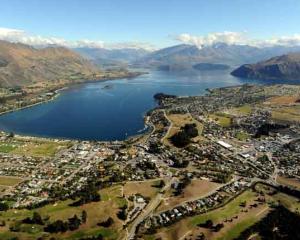Some Wanaka holiday homeowners are not impressed by the Queenstown Lakes District Council's proposed visitor accommodation rule variations and say they will never let their home for long-term rent.
The proposed changes were formally notified to the public last month and will have the most effect on absentee owners wanting to let their property for short-term rentals.
The new rules only allow up to 28 days' short-term rental a year, with no more than three separate lettings.
Anyone wanting to rent their property on a short-term basis for more than 28 days will now need a resource consent to do so.
The hope of the changes was to create more long-term rentals in the market.
But holiday homeowner Anne Dowden said she would never let her property for long-term rent, and if it became too hard to rent it out short term, she would simply not bother.
Wellington-based Ms Dowden and her family of five bought their Wanaka home in 2013 primarily for skiing holidays as they were renting others' houses and commercial accommodation options in Wanaka did not suit a family with several children.
She said her family holidays there about six weeks a year, and it is used by friends for a further four weeks a year.
While she understood the reasoning for the council's attempts to provide local residents with more long-term accommodation, she believed the proposed changes would not alleviate the problem.
''I think the proposed rules are flawed for many reasons. I think they are based on an over-simplified view of the situation. I don't think the QLDC have nearly enough data on what will happen if they do this change.''
''If [the rules] are brought in, they won't change much for us really. People we know will use the house - other Kiwis and international tourists won't.''
''I'm quite certain this change won't be effective for solving the long-term accommodation issues and that it will have a wide range of predictable negative impacts.''
''This new rule will mean that Kiwi families won't be skiing in Otago skifields. Without holiday houses, there is almost no suitable accommodation.''
Council planning policy manager Ian Bayliss said there were several consented hotel developments in the district which, if developed, would greatly increase the amount of commercial accommodation for visitors, but acknowledged many visitors preferred to stay in residential homes.
Mr Bayliss said the council had planned ahead for having more visitors.
''Councils in high growth areas like Queenstown Lakes are required to provide enough capacity in their district plans for a range of types of housing to meet expected demand for population growth.''
''Council recently investigated this issue in detail as part of its evidence on the Proposed District Plan and concluded that the Proposed District Plan provides enough capacity to provide for the demand for residential and visitor growth for the next 30 years.''
''The [proposed] changes are directed more at curtailing the phenomenal growth of short-term letting in the main residential areas of the district and avoiding outcomes experienced in other resort communities and towns with huge visitor numbers where almost all housing is only available for short-term lets.''
Mr Bayliss stressed the council continually reviewed visitor accommodation rules.
''Queenstown and Wanaka are outliers in terms of the amount of visitor accommodation occurring in its residential areas. It makes sense to keep reviewing what is an appropriate balance between enabling people to use and enjoy their property as they wish and managing the effects of land use to best enable everyone's social and economic wellbeing.''












